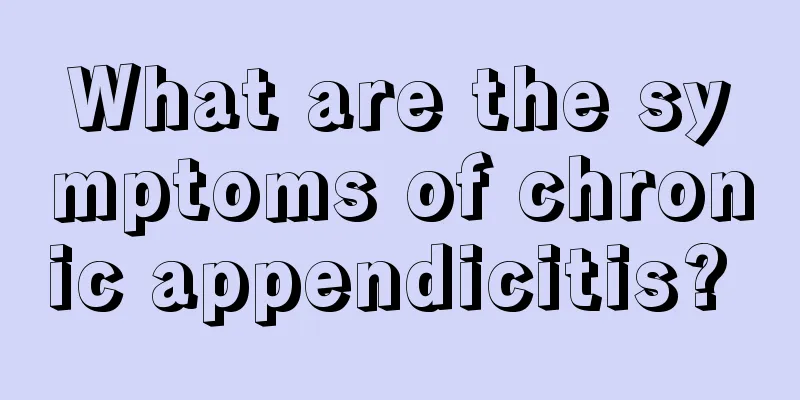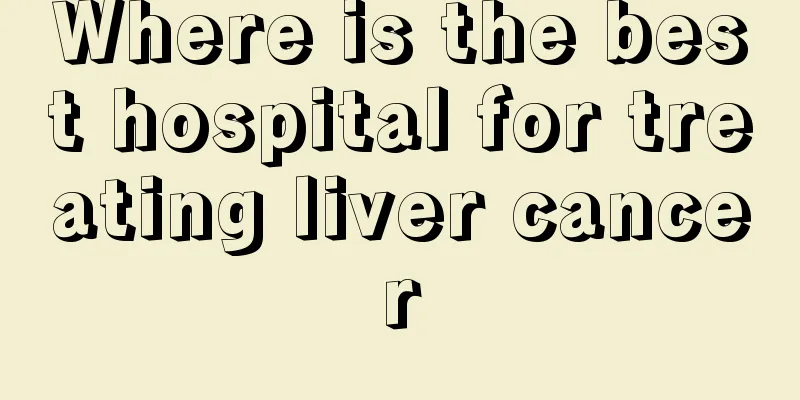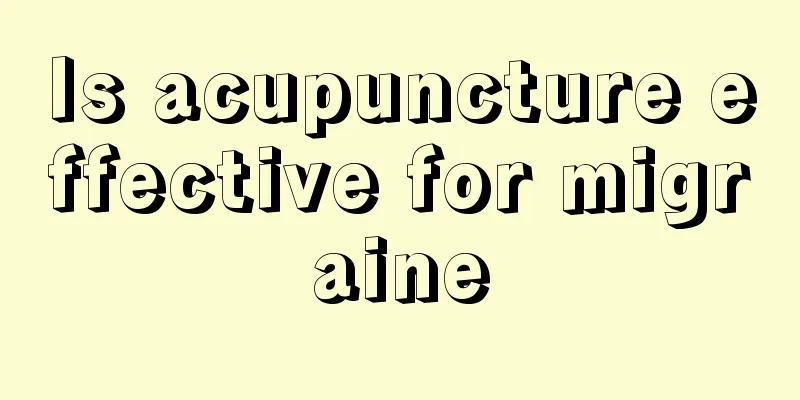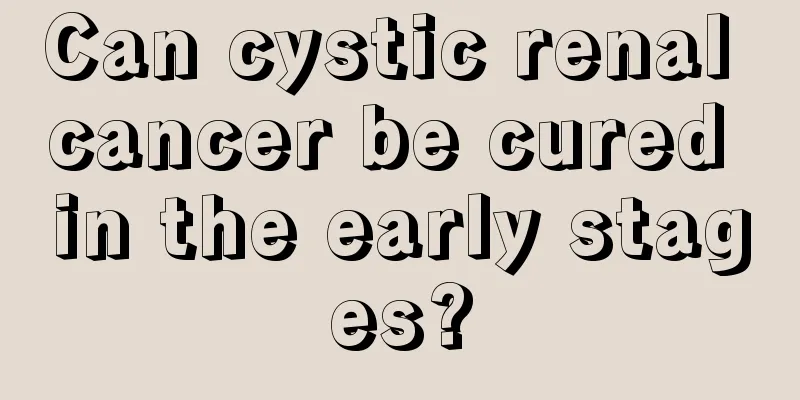What are the symptoms of chronic appendicitis?

|
Everyone is familiar with appendicitis. Many people have experienced appendicitis. Appendicitis is generally divided into chronic appendicitis and acute appendicitis. However, whether it is chronic appendicitis or acute appendicitis, patients will experience abdominal pain, abdominal tenderness and gastrointestinal reactions in the early stages. Generally, acute appendicitis requires timely control of the development of the disease to avoid a great impact on people's health. What are the symptoms of chronic appendicitis? What are the symptoms of chronic appendicitis 1. Abdominal pain: The symptoms of this chronic appendicitis are mainly located in the lower right abdomen, and are characterized by intermittent dull pain or bloating, which is sometimes severe and sometimes mild, and the location is relatively fixed. Most patients experience abdominal pain after a full meal, exercise, or long-term standing. There may be an attack of acute appendicitis during the course of the disease. 2. Abdominal tenderness: Tenderness is the only physical sign, mainly located in the right lower abdomen. It is generally small in range and constant in position. This symptom of chronic appendicitis will only appear when heavy pressure is applied. There is no muscle tension or rebound tenderness, and generally no abdominal mass, but a distended cecum can sometimes be felt. 3. Indirect signs: Various specific tender points such as McBurney's point, Langerhans' point, psoas sign and Roche's sign are meaningless in the diagnosis of chronic appendicitis. 4. Gastrointestinal reactions: Patients often experience varying degrees of indigestion and poor appetite. Symptoms of chronic appendicitis in patients with a long course of illness may include emaciation and weight loss. There is generally no nausea, vomiting, or abdominal distension, but elderly patients may suffer from constipation. Things to pay attention to in daily life for chronic appendicitis 1. Eat light food and avoid greasy food. Patients with chronic appendicitis should eat a light and less greasy diet. Generally speaking, warm meat foods, such as beef, mutton, and dog meat, should be consumed in moderation, and onions, garlic, peppers, and ginger should not be eaten too much; foods that have the effects of clearing heat, detoxifying, and promoting dampness, such as mung beans, bean sprouts, bitter melon, etc., can be eaten in moderation. 2. Keep bowel movements smooth. Eat more foods containing high levels of fiber to keep bowel movements smooth and develop good bowel habits. Because constipation can cause fecal stones to be impacted, resulting in obstruction of the appendix cavity and inducing appendicitis; or fecal stones can irritate the appendix mucosa, causing inflammation and causing appendicitis. 3. It is not advisable to walk a hundred steps after a meal. Walking a hundred steps after a meal is one of the traditional health-preserving methods, but patients with chronic appendicitis should not exercise immediately after a meal, nor should they engage in strenuous exercise on a normal basis, so as to avoid fecal stone impaction and the resulting illness. 4. Pay attention to rest to prevent fatigue. You should pay attention to rest, combine work and rest, and avoid fatigue. Because fatigue can reduce the body's immunity, which can easily induce appendicitis. Can chronic appendicitis be treated without surgery? First of all, people should understand that there are several types of appendicitis, and not all appendicitis requires surgery. Appendicitis is generally divided into two categories: acute and chronic. Acute appendicitis is further divided into simple, purulent, gangrenous perforated, and periappendiceal abscess. Acute simple appendicitis is just congestion and swelling under the mucosa, with mild inflammatory cell infiltration in the muscularis. It is the mildest form of appendicitis, with only localized right lower abdominal pain and tenderness. The body temperature and white blood cell count are normal. This type of appendicitis can usually be cured quickly with anti-inflammatory treatment or traditional Chinese medicine. Appendicitis is usually an indication for surgery, but there is also a lot of experience in treating it with traditional Chinese medicine or acupuncture. Therefore, when choosing a treatment method, the local conditions at the time must be considered and it cannot be generalized. Gangrene means that the blood supply to the appendix has been obstructed. The clinical manifestations are severe pain, obvious physical signs, and severe systemic symptoms. Perforation and peritonitis will almost certainly occur. Appendicitis is generally treated with surgery to remove the lesion as soon as possible and prevent the disease from further developing into serious complications such as portal vein inflammation. Perforated appendicitis is the most important type of appendicitis. It should be pointed out that once appendicitis is perforated, abdominal pain can be relieved. This is not a sign of improvement, but rather a progression of the disease. Do not be complacent. At this time, surgical treatment should be performed as soon as possible and the opportunity should not be missed. Of course, even this severe appendicitis can be cured with Chinese medicine, but it must be closely observed and treated in the hospital. Once conservative treatment is ineffective, surgery should be performed in time. If there are multiple attacks of right lower abdominal pain after acute appendicitis, without systemic symptoms or changes in peripheral blood counts, or if there is no history of acute attacks but the right lower abdominal pain is frequent, and other organ system diseases are excluded after some examinations, then it may be chronic appendicitis. For this type of appendicitis, since it recurs frequently and affects work and life, surgical removal of the appendix is the best treatment option. In recent years, due to the development of medicine, people have realized that the appendix is neither an unnecessary burden nor a simple degenerate organ. "God has given me talents for a purpose", and the appendix is an immune organ in the human body. It has the function of producing B lymphocytes and T lymphocytes. The former can differentiate into antibody-producing cells after metastasizing to other peripheral lymph node tissues. It is very important for maintaining the body's normal immune function. The body resists the production of cells after appendectomy. It is very important for maintaining the body's normal immune function. After appendectomy, the body's resistance will decrease, making it susceptible to infectious and contagious diseases. More seriously, the incidence of cancer increases after appendectomy. |
<<: Correction of misaligned teeth?
Recommend
What are the symptoms of prostate cancer? Four symptoms of prostate cancer make you suffer
Prostate cancer is a very terrible malignant dise...
What is the best cooking wine for cooking?
Cooking wine is often used in cooking fish in dai...
Is melanoma harmful to the human body?
The early symptoms of melanoma are not very obvio...
What diseases can high blood pressure cause? Why are the complications so serious?
The harm of hypertension cannot be underestimated...
Is it good to train abdominal muscles at night?
For many people who train their abdominal muscles...
What to do if your arms are cold
Each physiological part of the human body has its...
What should I pay attention to in my diet when I have digestive tract perforation
Patients with gastrointestinal perforation must p...
How to reduce armpit sweating?
Many people often sweat under their armpits in su...
What are the symptoms of blood-heat urticaria?
Everyone knows what kind of disease blood-heat ur...
How to choose a frying pan
Cooking with a pan is closely related to our live...
Contraindications of influenza vaccine
Vaccines are mainly drugs developed to prevent ce...
The clinical treatment knowledge of nasopharyngeal carcinoma needs to be always understood
Nasopharyngeal carcinoma is a disease that seriou...
What should I do if I don’t get enough sleep every day?
Sleep is very important for the human body. It ca...
What are the examinations after hemisection of thyroid cancer
After hemisection of thyroid cancer, it is necess...
Can patients with nasopharyngeal cancer eat light soy sauce?
Can people with nasopharyngeal cancer eat light s...









